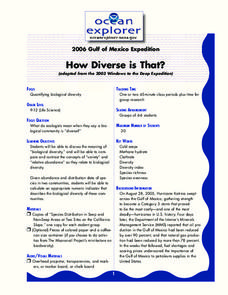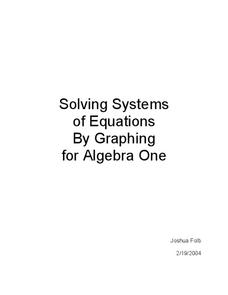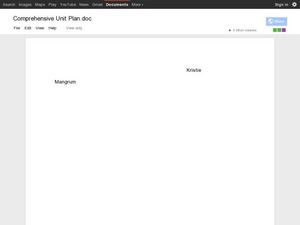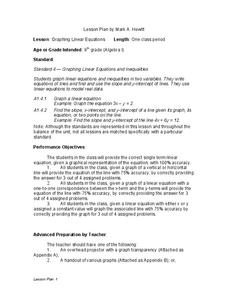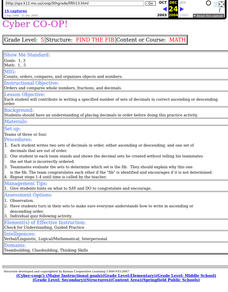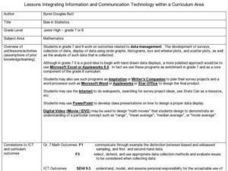Curated OER
How many isosceles triangles can you find?
Seventh graders recognize the characteristics of isosceles triangles. In this isosceles triangle lesson, 7th graders use geoboards to create isosceles triangles. Students record results and explain why they have an isosceles triangle.
Curated OER
Estimation and Your TV Diet
Students develop estimation skills by using real life situations. For this estimation lesson students collect data about their television watching habits. They make hypothesis about the number of hours they watch, how many commercials,...
Curated OER
Scientific Notation and Metric Prefixes
In this physics worksheet, students complete 5 sets of unit conversion problems. They express exponential expressions to expanded form and vice versa.
Curated OER
Pancakes, Pancakes!- Measuring
Students estimate measurements in real world problem situations. For this estimation lesson, students read the book Pancakes, Pancakes and estimate how many cups equal a pint, quart, and gallon. Students test their estimations by...
Curated OER
How Diverse is That?
Students discuss biological diversity in ocean communities. In this diversity lesson, students examine the variety of organisms compared to relative abundance. They will write an analysis and discuss their findings with the class.
Curated OER
The Handley Sports Problem
In this probability worksheet, 11th graders analyze how many students participate in four different sports using the probability of an event ocurring. There are 4 questions on this worksheet.
Curated OER
Sudoku Puzzle with Derivatives
In this Sudoku puzzle worksheet, students use basic derivative formulas, the chain rule and implicit differentiation to solve given problems. This six-page worksheet contains 26 problems. Answers are provided on the last page.
Curated OER
Preparation and Transition to Two-Column Proofs
Students investigate proofs used to solve geometric problems. In this geometry lesson, students read about the history behind early geometry and learn how to write proofs correctly using two columns. The define terminology valuable to...
Curated OER
Solving Systems of Equations
Young scholars identify the quadrants and axis of a coordinate plane. In this algebra lesson, students discover the ocrrect way to graph using the coordinate plane. They discuss the relationship between x and y values, domain and range...
Curated OER
Hurricane Frequency and Intensity
Students examine hurricanes. In this web-based meteorology lesson, students study the relationship between ocean temperature and hurricane intensity. They differentiate between intensity and frequency of hurricanes.
Curated OER
The Weather Around Us
First graders explore weather patterns. In this weather lesson, 1st graders research the daily weather by creating a graph of the daily weather conditions. Students use the computer to access information regarding the weather forecast....
Curated OER
The Life Cycle of the Mealworm
Fourth graders provide a habitat for live mealworms and observe their life cycle. In this animal life cycle and scientific inquiry lesson plan, 4th graders create a habitat for a live mealworm and observe and record related data as it...
Curated OER
Graphing Linear Equations
Ninth graders review the information that they have already learned
with regard to linear equations and graphical representations. They then assist in combining equations with a graphical element and complete various graphs with this...
Curated OER
PASS-N-PRAISE
Fifth graders take turns explaining, orally and in writing, how to solve multiplication problems that contain no more than three digit by two-digit numbers.
Curated OER
Find The Fib - Decimals
Fifth graders count, order, compares, and organize objects and numbers. Each student will contribute in writing a specified number of sets of decimals in correct ascending or descending order.
Curated OER
Conversions Using English Units
Students explore the concept of English units. In this English units lesson, students convert from one English unit to another English unit. Students estimate the size and weight of objects using English units.
Curated OER
Line Ups
Fifth graders describe the lunar cycle. develop an understanding of the order and phases of the moon. Each student in a team contributes orally in order to make a line up of the moon phases in order.
Curated OER
Does the Area of the Quadrilateral Change?
Students study area and quadrilaterals. In this multiplication and area lesson, students use Polystrip models to change rectangles to form different parallelograms. Students find the area of the models use a Geometer Sketchpad to find...
Curated OER
Mass Measurement
Middle schoolers explore geometry by completing a physics activity on-line. In this mass measurement lesson, pupils define the terms mass, volume, and density and identify their relationship with each other. They complete an on-line...
Curated OER
Mad Monster?
For this Halloween math worksheet, students use the color and number code to draw and color in a pattern on the blocks. When finished, students will have colored a picture of Frankenstein.
Curated OER
Logic
Middle schoolers solve problems using reasoning techniques, identify the validity or non-validity of problems and use deductive reasoning for problem resolution.
Curated OER
Finding Mean, Mode and Median in the Computer Lab
Students create spreadsheets which will display and figure mean, median, and mode of a set of numbers.
Curated OER
Bias in Statistics
Students work to develop surveys and collect data. They display the data using circle graphs, histograms, box and whisker plots, and scatter plots. Students use multimedia tools to develop a visual presentation to display their data.
Curated OER
Substitution Process in Problem Solving
Students apply the substitution process to solve equations with more than one variable. They explore how to use the process and when it should be used.






